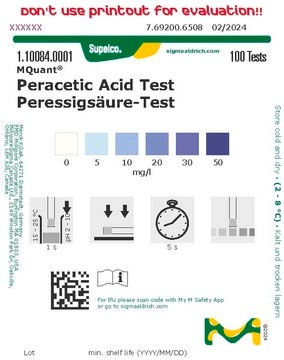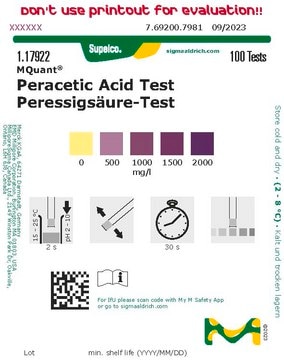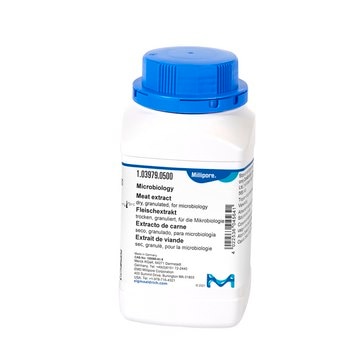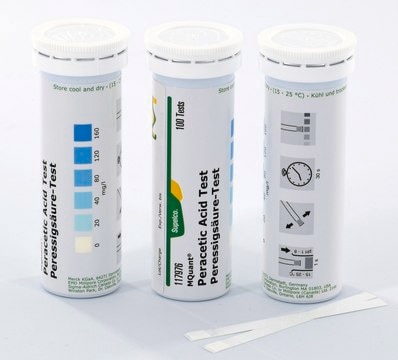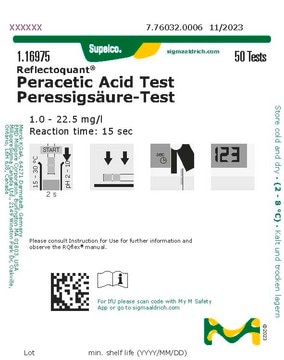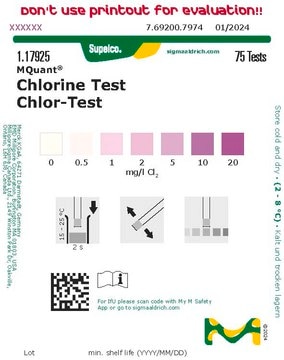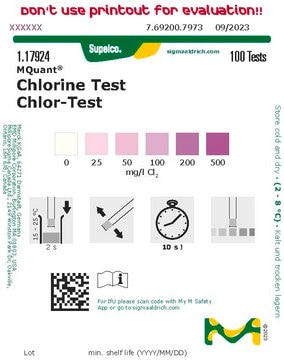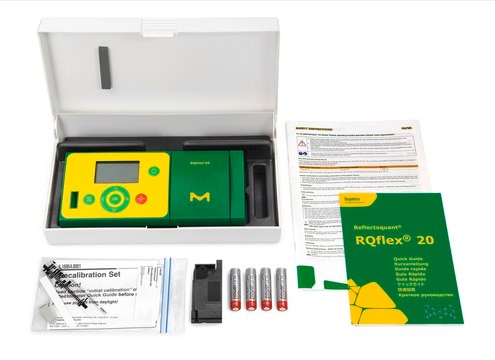1.10001
Peracetic Acid Test
colorimetric, 100-500 mg/L (peracetic acid), MQuant®
Synonym(s):
Peracetic Acid chemical test strips
About This Item
Recommended Products
description
semi-quantitative
Quality Level
product line
MQuant®
specific analyte(s)
peracetic acid
reaction suitability
reaction type: Redox Reactions
greener alternative product characteristics
Waste Prevention
Learn more about the Principles of Green Chemistry.
measuring range
100-500 mg/L (peracetic acid)
detection method
colorimetric
greener alternative category
storage temp.
2-8°C
General description
Method: Colorimetric, with test strips, 100 - 150 - 200 - 250 - 300 - 400 - 500 mg/L Peracetic acid, MQuant®
Peracetic acid is a frequently used disinfectant. Due to its measuring range the MQuant® Peracetic acid test strips are especially suitable to check the presence of effective levels in peracetic acid based disinfectants. As peracetic acid solutions are very unstable, frequent controls are necessary. Peracetic acid reacts with an aromatic amine to form a blue dye. The concentration of peracetic acid is measured semi-quantitatively by visual comparison of the reaction zone of the test strip with the fields of a color scale. The test strips are perfect for pre-testing a sample in an economic and quick way to estimate the peracetic acid concentration and a possible dilution factor prior to using a quantitative method such as a Reflectoquant® test.
Design for sustainability benefits:
We continue to demonstrate our commitment to our planet and a sustainable future by exploring ways to improve existing products in our portfolio. We have recently reviewed the current line of MQuant® test strips to identify key opportunities to minimize impact without compromising on the product performance.
This product has benefited from:
- Test strip with reduction
- Recycled aluminum tube
- Digital instruction leaflet
Learn more about the initiative: Small Changes to Test Strips for Big Impact.
We continue to demonstrate our commitment to our planet and a sustainable future by exploring ways to improve existing products in our portfolio. We have recently reviewed the current line of MQuant® test strips to identify key opportunities to minimize impact without compromising on the product performance. This product has benefited from:
Peracetic acid is a frequently used disinfectant. Due to its measuring range the MQuant® Peracetic acid test strips are especially suitable to check the presence of effective levels in peracetic acid based disinfectants. As peracetic acid solutions are very unstable, frequent controls are necessary. Peracetic acid reacts with an aromatic amine to form a blue dye. The concentration of peracetic acid is measured semi-quantitatively by visual comparison of the reaction zone of the test strip with the fields of a color scale. The test strips are perfect for pre-testing a sample in an economic and quick way to estimate the peracetic acid concentration and a possible dilution factor prior to using a quantitative method such as a Reflectoquant® test.
Application
- Efficient activation of peracetic acid by cobalt modified nitrogen-doped carbon nanotubes for drugs degradation: This study explores a novel method to enhance the efficacy of peracetic acid in degrading pharmaceutical compounds, highlighting its potential in environmental disinfection monitoring and safety applications in pharmaceutical manufacturing (Yao et al., 2024).
- Ecotoxicological evaluation of effluent from bovine slaughterhouses disinfected by peracetic acid (PAA): This research assesses the environmental impact of peracetic acid used in the disinfection of wastewater from bovine slaughterhouses, using the bioindicator Girardia tigrina, which is crucial for environmental safety assessments (Pereira et al., 2024).
- Peracetic acid activated by nickel cobaltite as effective oxidizing agent for BPA and its analogues degradation: This article presents a method for activating peracetic acid with nickel cobaltite to degrade BPA and its analogs effectively, addressing concerns over biocide efficacy and environmental safety (Kiejza et al., 2024).
- Accelerated removal of naproxen in the iron-based peracetic acid activation system by chloride ions: The study focuses on enhancing reactive oxidative species in water treatment processes, showing how chloride ions can boost peracetic acid′s efficiency, important for biocide applications and safety testing (Yu et al., 2024).
Linkage
Legal Information
Storage Class
11 - Combustible Solids
wgk_germany
WGK 1
Certificates of Analysis (COA)
Search for Certificates of Analysis (COA) by entering the products Lot/Batch Number. Lot and Batch Numbers can be found on a product’s label following the words ‘Lot’ or ‘Batch’.
Already Own This Product?
Find documentation for the products that you have recently purchased in the Document Library.
Customers Also Viewed
Articles
Learn about disinfection control and how to select the right disinfectant among the various options available in its methods and instrumentation based on photometry and reflectometry.
Our team of scientists has experience in all areas of research including Life Science, Material Science, Chemical Synthesis, Chromatography, Analytical and many others.
Contact Technical Service